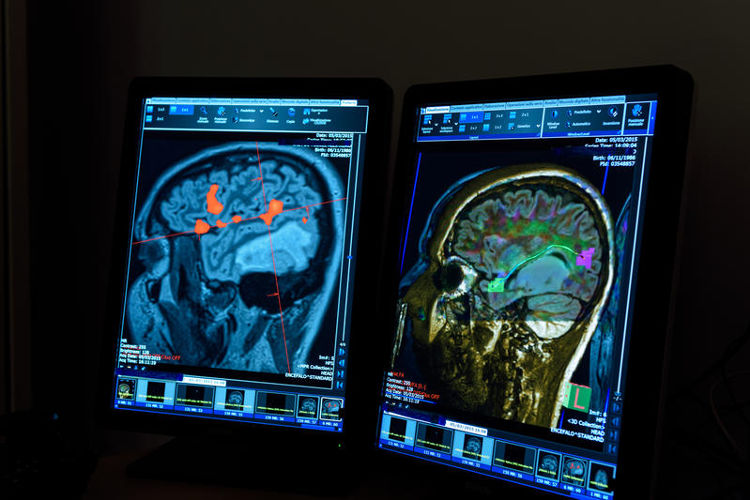ALAMEDA. “Bridging the Early Diagnosis and Treatment Gap of Brain Diseases via Smart, Connected, Proactive and Evidence-based Technological Interventions”

DATE 25th of January 2021
New opportunities for improved personalized healthcare and prevention have been enabled by the recent advances in the design and development of Innovative health risk prediction and intervention tools: digital transformation is a challenging necessity due to the global problem of healthcare workforce shortage that is believed to reach a deficit of about 4.1 million skilled health professionals (midwives, nurses and physicians) by 2030 in the EU, according to the World Health Organization.
In the case of brain diseases research, technological advances have been proved particularly effective. Big Data Analytics and Machine Learning methods can provide clinically actionable information that can complement medical recommendations and foster better treatments. This is particularly important because neurological disorders account for an increasing burden in terms of disability-adjusted life-years (DALYs) (i.e., the number of years lost due to ill-health, disability or early death), ranking third after cancer and cardiovascular diseases.
|
ALAMEDA is a European collaborative project that receives funding from the European Research and Innovation Programme Horizon 2020. ALAMEDA acknowledges that the care of patients with brain disorders is complex and manifestations of certain diseases could worsen over time and seriously impair the quality of life of patients and their caregivers: regular rehabilitation treatment assessments are essential (i) to ensure that medical interventions are impactful and (ii) that relapse incidents can be foreseen. ALAMEDA’s vision is to research and prototype the next generation of personalized AI healthcare support systems for people with brain diseases and disorders, specifically focusing on the needs of patients with Parkinson’s, Multiple Sclerosis and Stroke (PMSS). The project’s innovations will take advantage of new machine learning models, built upon lifestyle retrospective data as well as new streams of patient data that involve the monitoring of everyday activities, such as sleep behaviour and emotional status. The success of such applications will provide clinicians with the opportunity to modify interventions based on personalized data recordings, that could include both pharmacological and non-pharmacological therapeutic options, such as exercise regimens. ALAMEDA’s machine learning and Artificial Intelligence (AI) methodology will ensure that the algorithms are interpretable and provide explanations for their outcomes. |
Although we have witnessed a continuous increase of knowledge and better understanding of the value of specific measures and treatment programs, appropriate evaluation of the impact of rehabilitation on PMSS patients remains a challenge that is urgent to tackle to increase the capacity of the healthcare system and make it possible to develop new and personalized treatment options.
”The Consortium of ALAMEDA brings technical and medical experts together to rethink and revolutionize the ways that PMSS patients are treated, with the ultimate goal of improving their quality of life” said Dr Konstantinos Demestichas, coordinator of ALAMEDA and R&D Project Manager at the Institute Of Communication and Computer Systems.
The application of digital technologies to specific healthcare issues and chronic conditions has the potential to generate rich diagnostic data streams. Big Data management and AI methods are then applied on these data streams to disaggregate them into meaningful information components that provide smart personalized healthcare guidance, underpinning existing practices and medical protocols. In the years to come, ongoing research is expected to bring unprecedented progresses through risk prediction tools, modeling and improved disease understanding.
The use of AI methods (Big Data Analytics, Machine and Deep Learning) as predictive tools is particularly relevant for brain diseases as, in many cases, by the time all the clinical symptoms manifest, so that specialists can make a definitive diagnosis, the outcomes are essentially irreversible. In this light, better tools for assisting the detection of early signs of brain disease are needed. Advances in machine intelligence have created powerful capabilities in algorithms that find hidden patterns in data, identify anomalies in “expected” patterns and associate similar patients/diseases/drugs based on common features. In healthcare, it is expected that Deep Learning will bring a disruption, paving the way to a paradigm shift in Clinical Decision Support Systems (CDSSs), diagnosis and treatment selection. This change is further fueled by the recent advances in the digitalization of healthcare records, including assets such as medical reports, imagery, or sensory data.
We have no choice but to pursue all these progresses in order to improve patients‘ and caregivers‘ quality of life, and ALAMEDA is ready to do it!
PROJECT FACTS
• Project acronym: ALAMEDA
• Start date: 01 January 2021
• Duration: 36 months
• Budget: €6M
• Coordination: Institute of Communication and Computer Systems (Greece)
The consortium of ALAMEDA comprises 15 partners from 8 different European countries: Institute Of Communication and Computer Systems (ICCS); Ethniko Kai Kapodistriako Panepistimio Athinon (NKUA); Ethniko Kentro Erevnas Kai Technologikis Anaptyxis (CERTH) and Enora Innovation Etaireia Psifiakon Texnologion Kai Ergon Kainotomias Idiotiki Kefalaiouxiki Etaireia (ENO) from GREECE; Wellics Ltd (WCS) from UNITED KINGDOM; EY Advisory SPA (EY), Fondazione Italiana Sclerosi Multipla Onlus (FISM) and Pluribus One Srl (PLU) from ITALY; Universitatea Politehnica Din Bucuresti (UPB) and Spitalul Universitar De Urgenta Bucuresti (SUUB) from ROMANIA; Norges Teknisk-Naturvitenskapelige Universitet (NTNU) from NORWAY; Unisystems Luxemburg Sarl (UNISYS) from LUXEMBURG; Wise Angle Consulting SL (WISE) from SPAIN; Catalink Limited (CTL) and University of Nicosia (UNIC) from CYPRUS.
